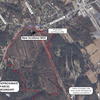Baron suit against VCSD is dismissed; former coach ‘quite likely’ to appeal
Enterprise file photo — Michael Koff
Robert Baron, the longtime head coach of the girls’ varsity basketball team, resigned from the job in November 2017 amid unstated allegations. In March 2018, he filed a lawsuit against the Voorheesville Central School District claiming he was tricked into resigning and asked the court to reinstate him as coach. This week, the judge in the case dismissed the lawsuit.
NEW SCOTLAND — Three years and three weeks after it was first filed, the lawsuit brought by the former Voorheesville varsity girls’ basketball coach, Robert Baron, against the school district has been dismissed.
Baron filed the suit in March 2018, alleging the district fraudulently induced him to resign as the longtime head coach. The suit sought Baron’s reinstatement as coach as well as payment for lost wages and damage to his reputation.
“We were extremely shocked and surprised at Judge [Kimberly] O’Connor’s decision,” said Harold Gordon, Baron’s lawyer. “I would venture the opinion that in their heart of hearts the district and the union were equally surprised. On behalf of Mr. Baron, we respectfully disagree with the conclusions reached by Judge O’Connor and it is quite likely that Mr. Baron will be appealing.”
In a statement to The Enterprise, the Voorheesville Central School District said it was “very pleased with this outcome. The Court issued a comprehensive decision that considered all the evidence, thoroughly weighed the parties’ arguments, and reached the correct result.”
It all began at an early-morning special board of education meeting, on Nov. 21, 2017, where a quorum of board members all voted to accept Baron’s resignation as girls’ varsity basketball coach.
The resignation had been effective Friday, Nov. 17, 2017, the day after an article appeared in The Enterprise that said: “In response to community concerns about girls’ basketball coach, Robert Baron, The Enterprise left many phone messages for Baron and for Voorheesville athletic director, Joseph Sapienza but received no response.”
On Nov. 13, 2017, The Enterprise was told by then-Superintendent Brian Hunt: “Right now, we’re investigating a situation. That’s all I can tell you.”
Baron would file his suit four months later.
The decision
Judge O’Connor in her March 29 decision went through each one of Baron’s eight causes of action.
First cause of action: Baron was fraudulently induced to resign.
On this claim, Baron had sought a declaratory judgement, a sort of legal end-around for cases that are not likely to succeed.
In December 2018, O’Connor found this claim to lack merit and dismissed it.
O’Connor also said that the school district was a public corporation, meaning Baron couldn’t be awarded punitive damages.
However, two weeks later, Gordon, based on O’Connor’s decision, filed an amended complaint with two new causes of action — a seventh cause of action for defamation based on what Baron claims to be false statements made by then school board President Doreen Saia during a board meeting, and an eighth cause of action, again, that Baron was fraudulently induced to resign.
Second cause of action: Rescission of resignation.
Baron’s second cause of action looked to nullify and invalidate his resignation as well as the district’s acceptance of the resignation, while also reinstating him as coach. Baron alleged that his resignation was fraudulently induced and coerced, which would have made it involuntary.
O’Connor points to the district’s court papers in making her explanation for dismissing this cause.
“The elements of a cause of action for fraud require a material misrepresentation of fact, knowledge of its falsity, the intent to induce reliance, justifiable reliance by the plaintiff, and damages,” O’Connor wrote.
Both sides focus on the use of the word “floodgate” in a meeting where Baron was informed he would no longer be coach.
At the Nov. 16, 2017, meeting, Sapienza told Baron there had been a “floodgate” of complaints against him and Baron would lose his job because of them.
“The parties dispute whether Director Sapienza used the phrase to mean there were numerous complaints about Baron or that an initial complaint prompted other complaints about Baron,” the judge’s decision states.
But Voorheesville was able to prove that, prior to the Nov. 16, 2017, meeting, it had received nine complaints against Baron. “The evidence of nine complaints shows that Director Sapienza’s ‘floodgate’ statement was true when he spoke to Baron at the meeting,” O’Connor wrote.
And Baron had also discussed his resignation before Sapienza had made the “floodgate” statement, according to O’Connor, which she cited as “further evidentiary proof showing that Baron discussed resignation after Superintendent Hunt and Director Sapienza told Baron he was terminated as coach, not after the ‘floodgate’ statement.”
Also, O’Connor stated that the school district “proffer[ed] evidentiary proof” that Baron admitted he didn’t understand what Sapienza meant with his “floodgate” statement at the Nov. 16, 2017, meeting. “This evidence negates that Baron justifiably relied on the statement when [he] resigned as coach,” according to O’Connor. “He could not justifiably rely on a statement he did not understand.”
The judge concluded that the school district “did not abuse its discretion or act arbitrarily or capriciously by denying Baron’s requests to rescind his resignation and reinstate him.”
Third cause of action: Age discrimination.
Baron’s third cause of action alleged that Voorheesville had a pattern of terminating coaches after age 60; Baron was 67 when he resigned.
O’Connor wrote that “Superintendent Hunt, Director Sapienza, and the same Board of Education which hired Baron as coach of the 2017-2018 season at 66-years-old, also terminated him in less than a year … It is unlikely that the same people who hired Baron at 66-years-old would discharge him motivated by age discrimination shortly thereafter.”
Fourth cause of action: Breach of duty, fair representation.
Baron’s fourth cause of action asked the court to declare that he is covered by the collective-bargaining agreement between the school district and the Voorheesville Teachers’ Association, which along with New York State United Teachers were also named in the suit, entitling him to representation from the union and making him subject to the grievance procedures in the collective-bargaining agreement.
The union was able to prove Baron had never been a member of the Voorheesville Teachers’ Association, never paid union dues or agency fees, and never sought assistance from the Voorheesville Teachers’ Association prior to submitting his letter of resignation.
Fifth and sixth causes of action: Breach of contract, evaluation and grievance procedures.
In his fifth cause of action, Baron asked that he be awarded damages for a breach of the collective bargaining agreement’s evaluation procedures, which outlines how an employee’s job performance is to be assessed. Baron asked for damages in “the amount of his lost coaching wages and an amount to be determined at trial for the damage to his reputation, including his professional reputation as a coach in the community.”
In the sixth cause of action, Baron was seeking similar damages for a breach of the collective bargaining agreement’s grievance procedures.
O’Connor wrote that the “fifth and sixth causes of action are based on his allegations that the VTA breached its obligations set forth in the CBA [collective bargaining agreement]. Those causes of action assume that the CBA applies to Baron in his position as a non-teacher coach,” which he was not.
Also, Voorheesville was able to produce a list, created during negotiations between the union and school district, that described Baron “among other coaches, as a ‘non-VTA’ member,” according to O’Connor.
Additionally, the judge stated that Baron didn’t challenge any of Voorheesville’s “evidentiary proof”; rather, he chose to challenge its “admissibility,” focusing on the affidavits of Hunt and then-president of the VTA Kathy Fiero — but Baron never addressed their actual deposition testimony.
Seventh cause of action: Defamation.
In his June 2018 court filing, Baron added the defamation claim against Saia.
At the Nov. 21, 2017, school board meeting school board where Baron’s resignation was accepted, Saia, the board’s president at the time, “made the following gratuitous defamatory comments,” according to Baron’s court filing:
“Youth sports is enormously important, and I sit on those sidelines all the time .... So — understand — that we care very, very much about what happens to your children, and this team .... This one hit me hard too, because I see how important sports are for students — incredibly important .... We were faced with some difficult issues .... At the end of the day, these girls deserve our best.”
The comments were published several times in The Enterprise, the filing stated. “Speculation was immediately born as to the meaning of Ms. Saia’s comments in this ‘Me Too’ era,” according to the court documents. “As a result, rumors began to swirl around the Voorheesville community as to whether Baron had sexually assaulted any of the players on his team.”
O’Connor wrote, “To constitute defamation, Baron must prove that defendants made a false statement, published the statement to a third party without privilege, with fault measured by at least a negligence standard, and the statement caused special damages or constituted defamation per se.”
Voorheesville was able to prove Saia did not defame Baron for two reasons.
The statement makes no mention of the former coach — it makes no mention of any person, in fact.
And second, there’s no “false statement of fact” contained in the statement, something with which Baron agreed. “Baron himself testified that, on its face, nothing in President Saia’s statement is false,” O’Connor wrote.
Eighth cause of action: Fraudulent inducement.
The court concluded, “Baron did not show facts sufficient to require a trial on any issue of fact concerning his fraud cause of action.”



